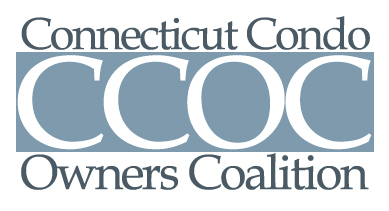FAQ FOR OWNERS
 The following information is based on the best information we have available. Before acting on any advice contained here, get an opinion from your condo association lawyer and your personal attorney.
The following information is based on the best information we have available. Before acting on any advice contained here, get an opinion from your condo association lawyer and your personal attorney.
Where is a good place on the Internet to learn about condo laws supervised by the Connecticut Department Of Consumer Protection?
http://www.ct.gov/dcp
Are there are circumstances that a unit owner can refuse to pay maintenance fee?
No. Under no circumstance can you protest by withholding your monthly fee. All condo boards have the power to take you to court and foreclose on your unit for failing to pay your fee. You will also have to pay for the condo board’s attorney.
Can a unit order refuse to pay a fine, even if it was not assessed legally.
No. Pay the fine and then challenge the fine through small claims court.
Is there any standard on what the general assembly meant when it said property managers can charge a reasonable fee for making copies of documents for owners?
There are many definitions to “reasonable” in terms of law. According to the OLR (Office of Legislative Research) there is no standard. CCOC continues to seek a standard for this. The CGS states that the “association” is responsible for setting the standard.
Are contracts with Property Managers available under law to unit owners?
Yes. Several aspects of CGS 47-260 show that contracts with Property Managers are available to unit owners. E.g. “(9) Copies of current contracts to which the association is a party;” unless they are “(1) Contracts, leases and other commercial transactions to purchase or provide goods or services, currently being negotiated;” This is only applicable to Post-1984 communities or Pre-1984 communities that are CIOA complaint.
Are there any condo contracts that can be held as confidential?
Information regarding contracts in general, as well as what can and cannot be disclosed can be found in CIOA compliant associations, under CGS 47-210, 47-247, as well as several others including CGS 47-260 as shown above. In short, a contract in which the association is a party to cannot be held as confidential except under special circumstances.
What financial documents can be withheld legally from unit owners?
Only those as specified under CGS 47-260: (1) Personnel, salary and medical records relating to specific individuals, unless waived by the persons to whom such records relate; or (2) Information the disclosure of which would violate any law other than this chapter. (d) Records retained by an association may be withheld from inspection and copying to the extent that they concern: (1) Contracts, leases and other commercial transactions to purchase or provide goods or services, currently being negotiated; (2) Existing or potential litigation or mediation, arbitration or administrative proceedings; (3) Existing or potential matters involving federal, state or local administrative or other formal proceedings before a governmental tribunal for enforcement of the declaration, bylaws or rules; (4) Communications with the association’s attorney which are otherwise protected by the attorney-client privilege or the attorney work-product doctrine; (5) Records of an executive session of the executive board; or (6) Individual unit files other than those of the requesting owner.
Can you tape record or video condo board meetings?
It depends on what the by-laws of the association say. One interesting question is what if the board tapes the meeting, can it then prohibit anyone else from recording it?
Are minutes required to contain all the important information and must it be accurate?
Unfortunately there are no state laws requiring that all important actions, votes or comments be included in minutes of meetings. Though if you want something in the minutes I would urge you to state that in writing if writing a letter to the board and state in verbally at the meeting. And if they are not in the minutes I would raise holy heck.
Are meetings required to be held under Robert’s Rules of Order?
Yes, but the rules can be suspended by a vote of majority of board members.
Are board members personally liable for stupid, or negligent actions?
Not now. But there was a recent court decision in New York that said board members can be personally liable if their actions warrant it.
Does Ct Condo Law Require Bids For Major Improvements?
Unfortunately not. It is up to each condo association and of course their governing documents.
How can I become a CCOC member?
Simple. On the top right of all pages on CtCondoNews.com there is a sign-up section. Just fill it out.
Can CCOC members ask that their complaints be investigated?
Yes. Please contact george@ctcondonews.com
Can I inspect proxies cast in an election or meeting?
Yes. Proxies are Association records. Unit owners can examine and make copies under Section 47-260(a)(11) of the Statutes. Have to do so within one year after vote.
What Rights Do Condo Owners Have at Condo Board Meetings?
Answered by Atty. George Coppolo
UNIT OWNER RIGHTS AT CONDO BOARD MEETINGS
Reportedly, some Condominium Boards of Directors are requiring that unit owners notify the board of their intention to appear at a board meeting and to let the board know if they wish to speak at the meeting. Once they notify the board, they are given a specified time to attend the meeting and asked to leave once they have spoken. This practice seems contrary to the letter and spirit of the Common Interest Ownership Act (CIOA), which is the law that governs most condominiums in Connecticut.
CIOA requires that Board meetings be open to the unit owners and to a representative the unit owner designates except during executive sessions (CGS 47-250(b)(1). The Board may hold an executive session only during a regular or special meeting of the Board. No final vote or action may be taken during an executive session.
An executive session may be held only to:
- Consult with the Association’s attorney concerning legal matters;
- Discuss existing or potential litigation or mediation, arbitration or administrative proceedings;
- Discuss labor or personnel matters;
- Discuss contracts, leases and other commercial transactions to purchase or provide goods or services currently being negotiated, including the review of bids or proposals, if premature general knowledge of those matters would place the Association at a disadvantage; or
- Prevent public knowledge of the matter to be discussed if the executive Board or committee determines that public knowledge would violate the privacy of any person (CGS 47-250(b)(1)).
At each Board meeting, the Board must provide a reasonable opportunity for unit owners to comment regarding any matter affecting the common interest community and the Association (CGS 47-250(b)(4).
Unless the meeting is included in a schedule given to the unit owners, or the meeting is called to deal with an emergency, the secretary or other officer specified in the bylaws must give notice of each Board meeting to each Board member and to each unit owner. The notice must be given at least five (5) days before the meeting and must state the time, date, place, and agenda of the meeting, except that notice of a meeting called to adopt, amend, or repeal a rule must be given at least ten (10) days before the meeting (CGS 47-261b(a);CGS 47-250(b)(5)).
If any materials are distributed to the Board before the meeting, the Board at the same time must make copies of those materials reasonably available to unit owners, except that the Board need not make available copies of unapproved minutes or materials that are to be considered in executive session (emphasis added) (CGS 47-250(b)(6).
It should be noted that CIOA allows the Board to act by unanimous consent as documented in a record authenticated by all its members. The Board’s secretary must promptly give notice to all unit owners of any action taken by unanimous consent (CGS 47-250(b)(8)).
Remember you have to act quickly if the board violates any of these legally guaranteed rights. The law specifies that even if an action by the Board does not comply with the above legal requirements, it is valid unless set aside by a court. A challenge to the validity of an action of the Board for failure to comply with the above described legal requirements must be filed within sixty (60) days after the minutes of the challenged Board meeting are approved or the record of that action is distributed to unit owners, whichever is later (CGS 47-250(9)).
If your Board is not complying with the law, let Board members know about their legal obligations. If that does not work, you can challenge the board through all the democratic options CIOA provides (For example, calling for a special meeting of the Unit Owners Association; voting board members out of office ;etc.) as well as taking the Board to court. Also don’t forget to consult the declaration and bylaws. Your condominium documents may give you even greater rights.
This article is for general informational purposes only, does not constitute and should not be relied upon as legal advice and does not create an attorney-client relationship between the author or the author’s law firm (Gordon, Muir and Foley, LLP) and any party. Statutes and case law vary from jurisdiction to jurisdiction and may change from time to time. You should consult a licensed attorney for legal advice relating to your specific situation.




